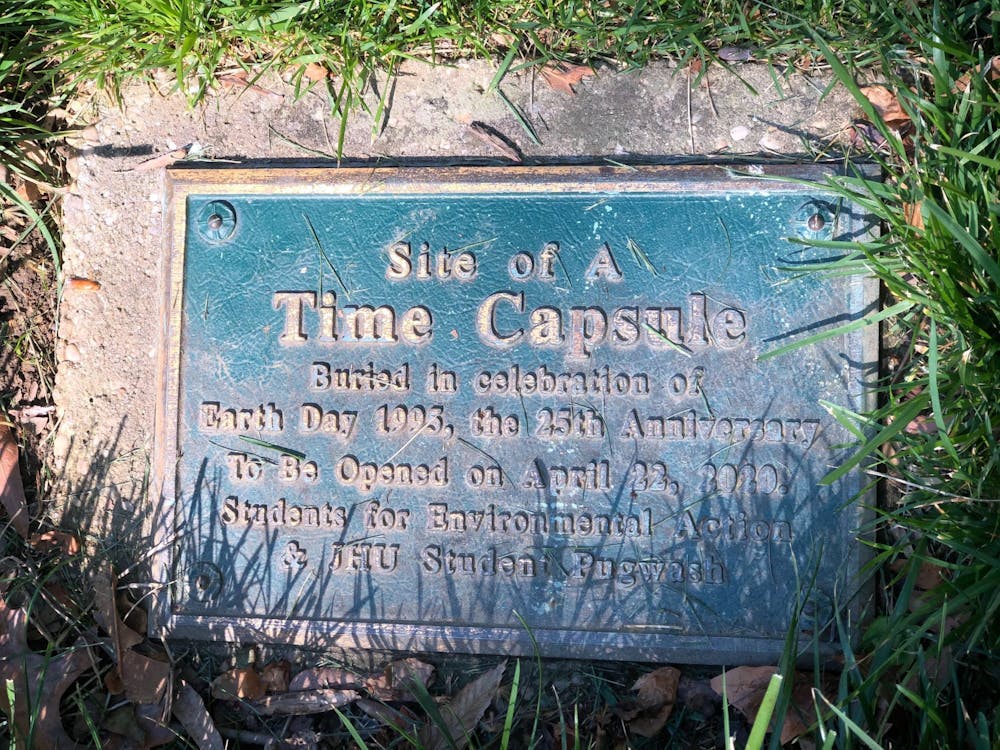Twenty-five years ago, Hopkins students buried a time capsule outside of the Milton S. Eisenhower Library to be opened on Earth Day 2020. In 1995, a student involved with the project hoped that those opening the vessel would reflect on how much progress had been made since 1970 and be inspired for the next 25 years of environmental action.
Since the first Earth Day 50 years ago, students at Hopkins have been fighting for our planet. After Hopkins became one of the first colleges to create a recycling department in 1980, students continued to petition and lobby the administration to expand recycling services at Homewood. When the time capsule was buried, existing groups like Students for Environmental Action were busy hosting events for Earth Day.
Since 2012, Refuel Our Future has been pushing for the University to divest from fossil fuel companies. After the University announced in 2017 that it was only divesting from thermal coal, Refuel did not stop fighting. They have held multiple demonstrations over the past few years and began the Fossil Free Fridays campaign last semester.
Even during the ongoing coronavirus (COVID-19) pandemic, students have shown their commitment to environmental action. Wings, a student-led nonprofit dedicated to menstrual health education and advocacy, hosted a webinar on how to be more sustainable with menstrual products. Advanced Academic Programs launched a weekly series of “lightning talks” on environmental topics. Refuel and the College Climate Coalition are celebrating #DivestDay on April 23.
These student groups continue to remind us that environmental activism should not stop because of the pandemic. They remind us that now, more than ever, we need radical change to save our planet.
The fight against climate change has been a frustrating one. Since the first Earth Day, the future of our natural environment has grown bleak. No matter how persistent activists like our fellow students are, Hopkins and other institutions in power can be slow to change. For instance, our administration is unlikely to fully divest its holdings from fossil fuel companies. It also maintains its contracts with environmentally unsustainable companies like PepsiCo.
However, this is not to say that the University has not made great strides. We were one of the first schools to establish a recycling department. Last Earth Day, University President Ronald J. Daniels announced that by 2025, the University’s domestic campuses would reduce its carbon emissions by 51 percent.
Among college campuses in the U.S., our dining facilities stand out for their sustainability. Many cafes on campus do not offer plastic straws unless explicitly asked, and Charles Street Market encourages the use of reusable bags with a discount. We use compostable plastic at almost all campus dining locations.
Such changes, however, may not be enough in the long run. As devastating as this pandemic is, one thing has become increasingly clear: We are all capable of doing more for our planet.
In the past few weeks, we have observed the impact of social distancing and lockdown measures on our planet. People are driving and flying less, significantly reducing greenhouse gas emissions. Consumers are more mindful about their purchases, reducing waste. These changes have already had a significant impact on the natural world around us.
This pandemic will eventually be over, but we cannot resume living the way we did before. Instead, we must think about what we can learn from this crisis.
We must radically change the way we consume our planet’s resources. Individuals and powerful institutions alike must recognize the impact their behavior has on the environment, on vulnerable populations and on future generations.
Throughout history, people in this country have come together after crisis. When we finally leave this pandemic behind us, we hope solidarity follows. Last week, we called upon the Hopkins community to build a more unified campus, to establish new norms of empathy and support. These norms must also apply to our fight against climate change.
It is our duty to begin living more intentionally and think about our choices. We need to treat each other — and the Earth — better. Over the next 25 years, we hope that this, combined with a renewed sense of unity, will help us make the greatest tangible difference.





